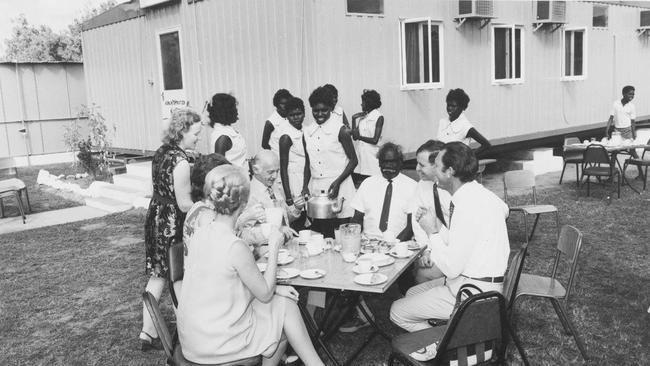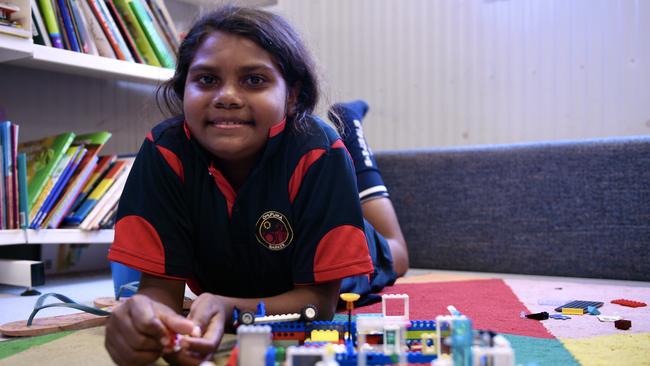Nestled among the dense bauxite coastline of East Arnhem sits a remote community that is reimagining the future of education. There is a tangible joy at Dhupuma Baker infant and primary school. A joy seeded in belonging.
Students experience a gentility to education; a cyclical approach that gives the whole community power to shape its future. This intergenerational learning creates a space for Yolngu djamarrkuli (children) living in remote Gunyangara to dream.

Learning is centred in Yolngu lore, before moving into western knowledge systems and the day finishes with on-Country lessons, an activity that often turns the students into teachers.
This two-way learning is grounded in decades of knowledge shared with Elders, who 40 years ago experienced a school that combined Yolngu knowledge and Balanda (non-Indigenous people) learning.
In 1972, the original Dhupuma College was opened by Prime Minister William McMahon. During the opening address he spoke about the need for Aboriginal communities to retain identity and culture despite the clear inequalities of Australian society.
“The opening of a new school to meet the needs of an Aboriginal community is a big event … soon in these building there will be new, young, fresh minds who will play their part in the future of our country,” he said.

Despite this prophecy proving true just eight years later the school was closed in 1980 leaving many remote students without an education. But when one experiences remote community, they understand innovation is the fabric their own communal resilience. Many Dhupuma College students went on to be some of the nation’s great leaders. Some went on to be a fierce Land Rights activists, others are family names in the arts and entrainment industry; their works have became renowned for pushing boundaries in race and politics. It was a place that fostered excellence.
Dhupuma is an idea that we look up and look forward. It is a belief that one can follow the stars, Yolngu ancestors, while also forging a new future. And so when Dhupuma Barker reopened in April 2021 it became the beginning many new opportunities for the next generation of Yolngu leaders.
For more than two decades, the Yothu Yindi Foundation (YYF) have been building the case for a Yolngu community run education hub. Their vision is to create education pathways that encompasses mother and infant to tertiary graduation, which is based in Yolngu Matha and lore, but retains necessary components of western curriculums.
Despite operating and funding the annual Garma Festival, YYF, like most Aboriginal Corporations, is not considered a learning institution under the current Federal education legislation. The deficit of such legislation makes it impossible for YYF to achieve this vision independent of existing institutions. However, the foundation’s leaders have secured long term partnerships that will bring enable their vision to become a reality.
In 2019, Head of Barker College Phillip Heath AM gave a speech at the Garma Festival which later proved to be the first partnership between him as the principal of a Sydney-based, North Shore private school and YYF.
The relationship developed into community consultations and two years later led to the reopening of the now known Dhupuma Barker in the remote community of Gunyangara; Dhupuma the school’s initial namesake, while Barker is the name of the Anglican college in Sydney.

“It is self-evident to me that starting early gives you the best opportunity to ensure that if there is a deficit in education, you close the gap early, before it has any time to open,” Mr Heath said.
“And so, this school came about, as something like this should, with local community connection and was embodied by the outstanding work of YYF, their leaders and the vision of Yolngu Elders.”
Further partnerships with Studio Schools Australia and University of Melbourne will see the grounds where Garma Festival is held turned into the Garma Institute, comprising a residential secondary school, and a University that offers TAFE and bachelor’s degrees.
The project has been a long-term dream of the Yothu Yindi Foundation chairman Dr Galarrwuy Yunupingu, who attended the original Dhupuma College in the 70s. The 1978 Australian of The Year was instrumental in the national Land Rights Act, helping to draw up the Yirrikala Bark Petitions.
However, Dr Yunupingu acknowledges his success as a result of the original Dhupuma College, he said it was not just a place but an idea that inspired a generation of leaders and artists who are now world-renowned.
“These are people who were given a chance of an education but in most cases had the opportunity to finish that journey taken away,” he said. “I wonder how high they could have flown if they had been allowed to train themselves fully.”

To extend the vision, earlier this year the Federal government committed $75m to Studio Schools Australia (SSA) in order to work with communities to establish four new secondary residential schools across north Australia.
SSA will open a residential high school on Gumatj lands in January 2023.
Chair of Studio Schools Australia Jennifer Westacott AO said the school will be based on the successful Yirramalay model in the Kimberley, where 90 per cent attendance rates have been achieved.
“This shows the government is listening to communities and business and has the courage to try new things and to do so in partnership with Aboriginal people,” Ms Westacott said.
At the time of the announcement, ATSI Human Rights commissioner June Oscar AO said Indigenous students benefit through full residential learning models.
“A full residential model of learning on Country, with a focus on health and wellbeing, while remaining close to family and community strengthens language and culture,” she said.
The enlightened vision however, sits in stark contrast to the state of Indigenous education, health and incarceration statistics in Australia.
YYF chief executive Denise Bowden said the development of the Garma Institute, in partnership with University of Melbourne (UoM) will offer both vocational training courses and university degrees.

“This is a community-led solution to closing the gap,” Mrs Bowden said.
“Too many of our kids are falling through the cracks which has all sorts of consequences including poor health, unemployment and high rates of incarceration.”
Ms Bowden called the education hub a game changer that will unlock potential for the next generation by properly integrating Yolngu knowledge and philosophy in the classroom.
The Garma Institute will be an education space that combines Yolngu cultural learning with a Western curriculum which will operate independently of the government education system.
Crucially, the partnership with Melbourne University will ensure Yolngu knowledge systems remain the intellectual property of the community. It’s a partnership only possible because of the long history, the University of Melbourne has with northeast Arnhem.
Currently, the university has a ‘place-based partnership’ with Yolngu to develop projects with Elders.
The University of Melbourne’s Mayatili Marika, a Yolngu woman based in Arnhem Land, said there are serious gaps in opportunities for young people in the region, which will be heightened by the exit of Rio Tinto in the coming years.
She alludes to stark statistics that currently show up to 80 per cent of school aged Yolngu students don’t complete high school.
“We are working really hard with our Elders to realise a vision of Yolngu-led education in the region because the current system is not working for our kids,” she said.
“That leaves a big gap, not just now but into the future. This is about doing things differently.”
The University of Melbourne is focused on the co-design of curriculum and research through collaboration.
“That will involve the activation and acknowledgment of Yolngu knowledge systems across mainstream academia,” Ms Marika said.
The proposed Garma Institute will appoint a series of Elders as the Yolngu Faculty, who will find intersections between westernised academia and traditional knowledge systems.
“It really is about giving our people options, not everyone will want to go to university but if we can offer Yolngu designed, led and taught options then it will create a whole new pathway.”
The plans include traditional Yolngu knowledge keeping and teaching practices, including a museum, library, keeping place, women’s healing programs and facilities.

The ambitious education hub embodies much of the Territory’s recent Education Engagement Strategy but instead is owned and driven by the Yolngu community itself.
Dr Yunupingu’s contribution to Aboriginal land rights remains one of the most influential in Australian history, yet this dream will not only alter the course of his grandchildren’s future, but potentially revolutionise education nationally.
And so, almost fifty years after national leaders acknowledged the need for Aboriginal controlled community solutions to education, a vision is becoming reality. It will offer a future that looks up and looks forward. A place to belong.

Add your comment to this story
To join the conversation, please log in. Don't have an account? Register
Join the conversation, you are commenting as Logout
Gaps in Darwin maternity services highlighted through stories of loss
Darwin families are making plans to leave the NT as shocking testimonies reveal gaps in maternity care, with some mothers seeking help four times before tragedy struck.
Three Territorians, one lifesaving legacy as RLSS turns 60
From tea with the Queen to fighting for free swimming lessons, Daphne Read fought for six decades to stop NT kids from drowning while RLSS member Michael De Silva nearly did.